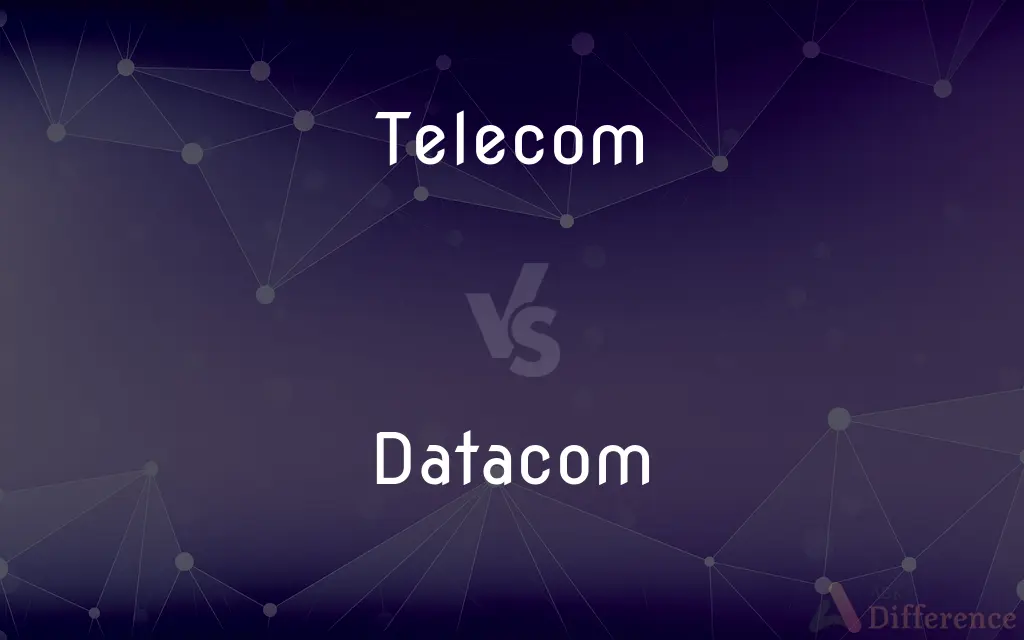Telecom vs. Datacom — What's the Difference?
By Tayyaba Rehman & Fiza Rafique — Updated on March 26, 2024
Telecom focuses on voice communication over distance, while Datacom encompasses data transfer and internet services.

Difference Between Telecom and Datacom
Table of Contents
ADVERTISEMENT
Key Differences
Telecom, or telecommunications, primarily deals with the transmission of voice and video over distances, utilizing various technologies like telephone networks, mobile communication, and satellite links. This field is rooted in traditional communication methods, evolving from wired telephony to include wireless mobile communications. Datacom, or data communications, on the other hand, focuses on the transmission of digital data, including internet services, email, and networked communications. It represents the backbone of the internet and modern digital infrastructure.
While Telecom traditionally prioritized voice communications, ensuring clarity and reliability across vast distances, Datacom emphasizes the efficiency, speed, and reliability of data transfer. The former is often associated with older, more established technologies such as landlines and cellular networks for calls and SMS, whereas the latter encompasses newer, rapidly evolving technologies like broadband internet, Wi-Fi, and fiber optics networks.
Telecom services are typically regulated by governmental agencies due to their critical importance in communication infrastructure and security. These regulations cover aspects such as service quality, pricing, and access. Datacom, while also subject to regulations, especially concerning data protection and privacy, operates in a more dynamically changing environment where technological advancements rapidly alter the landscape of services and capabilities.
In the realm of business and daily life, Telecom connects people through voice calls and text messages, playing a vital role in personal communication and emergency services. Datacom, conversely, enables the digital lifestyle of today, facilitating everything from streaming video to cloud computing, and is essential for businesses in the digital economy.
The convergence of Telecom and Datacom is increasingly evident as voice communication becomes just another type of data transmitted over the internet, exemplified by VoIP (Voice over Internet Protocol) and video conferencing technologies. This blurring of lines signifies a shift towards integrated networks that support a wide range of communication forms and services.
ADVERTISEMENT
Comparison Chart
Focus
Voice and video communication
Data transmission and internet services
Technology
Telephone networks, mobile communication, satellite
Internet, email, networked communication, broadband
Regulation
Heavily regulated by governmental agencies
Subject to data protection and privacy laws, with rapid technological changes
Role in Daily Life
Connects people through calls and SMS
Enables internet-based services like streaming and cloud computing
Evolution
From wired telephony to wireless mobile communication
From basic data transfer to comprehensive digital infrastructure
Compare with Definitions
Telecom
Enables long-distance voice communication.
Telecom companies provide services that enable international calls.
Datacom
Underpins the digital economy.
Datacom is the foundation of cloud computing, online transactions, and digital communications.
Telecom
Essential for emergency services.
Telecom networks are crucial for accessing emergency services via traditional dialing codes.
Datacom
Facilitates high-speed data transfer.
Datacom technologies enable the high-speed internet and data services used in homes and businesses.
Telecom
Relies on established network infrastructure.
Telecom infrastructure includes cell towers and undersea cables for connectivity.
Datacom
Driven by data privacy concerns.
Datacom services are designed with a focus on securing user data and ensuring privacy.
Telecom
Subject to strict regulations.
Telecom operators must adhere to government regulations regarding service provision and emergency communications.
Datacom
Involves cutting-edge technologies.
Datacom developments include fiber optics and wireless broadband technologies.
Telecom
Evolving with VoIP and other technologies.
Telecom is incorporating VoIP to offer voice services over internet protocols.
Datacom
Integrates with telecom in modern networks.
Datacom technologies are increasingly used to deliver traditional telecom services over digital networks.
Telecom
Telecommunications.
Datacom
Data communications
Telecom
A telecommunications company.
Telecom
(informal) Telecommunication or telecommunications.
Telecom
(informal) A telco phone company or telecom company.
Telecom
(often plural) systems used in transmitting messages over a distance electronically
Common Curiosities
What is the main focus of telecom?
Telecom focuses on transmitting voice and video communications over distances.
What does datacom involve?
Datacom involves the transmission of digital data, including internet services and networked communications.
How has the role of telecom evolved with digital advancements?
Telecom has evolved by integrating digital technologies, such as VoIP, to continue providing voice communication services.
What are some examples of datacom technologies?
Examples include broadband internet, Wi-Fi, fiber optics, and wireless broadband technologies.
What challenges face telecom and datacom industries today?
Challenges include keeping up with rapid technological advancements, ensuring data security, and meeting regulatory requirements.
How do telecom and datacom differ in technology use?
Telecom uses technologies like telephone networks and mobile communication, while Datacom relies on internet, broadband, and networked communication technologies.
What is the significance of telecom in emergency services?
Telecom provides essential infrastructure for accessing emergency services through traditional communication methods.
How is the privacy of data handled in datacom?
Data privacy in datacom is managed through encryption, secure protocols, and compliance with data protection laws.
Are telecom services more regulated than datacom services?
Yes, telecom services are typically more heavily regulated, focusing on service quality and access, while datacom deals more with data protection and privacy.
What role does regulation play in telecom and datacom?
Regulation ensures the quality and accessibility of telecom services, while in datacom, it focuses on protecting user data and privacy.
Can datacom services include voice communication?
Yes, through technologies like VoIP, datacom networks can carry voice communications.
How do businesses utilize datacom?
Businesses use datacom for digital communications, cloud computing, and to facilitate online transactions.
Why is datacom considered the backbone of the digital economy?
Datacom is crucial for enabling the digital lifestyle, supporting services like streaming, online transactions, and cloud computing.
What future trends are shaping telecom and datacom?
Future trends include the increasing convergence of services, the expansion of 5G networks, and the continuous growth of the Internet of Things (IoT).
How do telecom and datacom integrate in modern communications?
They integrate through technologies that allow voice and video communication to be transmitted over data networks.
Share Your Discovery

Previous Comparison
Metformin vs. Glibenclamide
Next Comparison
Granite vs. DoleriteAuthor Spotlight
Written by
Tayyaba RehmanTayyaba Rehman is a distinguished writer, currently serving as a primary contributor to askdifference.com. As a researcher in semantics and etymology, Tayyaba's passion for the complexity of languages and their distinctions has found a perfect home on the platform. Tayyaba delves into the intricacies of language, distinguishing between commonly confused words and phrases, thereby providing clarity for readers worldwide.
Co-written by
Fiza RafiqueFiza Rafique is a skilled content writer at AskDifference.com, where she meticulously refines and enhances written pieces. Drawing from her vast editorial expertise, Fiza ensures clarity, accuracy, and precision in every article. Passionate about language, she continually seeks to elevate the quality of content for readers worldwide.
















































